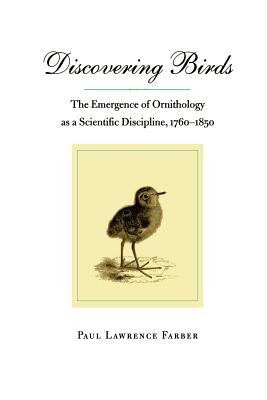
- We will send in 10–14 business days.
- Author: Paul Lawrence Farber
- Publisher: Johns Hopkins University Press
- ISBN-10: 0801855373
- ISBN-13: 9780801855375
- Format: 15.1 x 22.5 x 1.5 cm, softcover
- Language: English
- SAVE -10% with code: EXTRA
Reviews
Description
In this penetrating case study of the history of ornithology, Farber demonstrates interesting continuities: as natural history evolved into individual sciences (botany, geology, and zoology) and specialties (entomology and ichthyology), the study of birds emerged as a distinct scientific discipline that remained observational and taxonomic.
In Discovering Birds, Paul Lawrence Farber rejects the view that eighteenth-century natural history disappeared with the rise of nineteenth-century biology. In this penetrating case study of the history of ornithology, Farber demonstrates interesting continuities: as natural history evolved into individual sciences (botany, geology, and zoology) and specialties (entomology and ichthyology), the study of birds emerged as a distinct scientific discipline that remained observational and taxonomic. Ornithologists continued to see one of their primary tasks as classification, and they found no need to alter their approach.
Their efforts were greatly aided at the end of the eighteenth century as colonization and exploration brought new dataa plethora of exotic and previously unknown birds. By the mid-nineteenth century, ornithology had become a scientific discipline with international experts, a large empirical base, and a rigorous methodology of watching and cataloging.
EXTRA 10 % discount with code: EXTRA
The promotion ends in 18d.13:06:34
The discount code is valid when purchasing from 10 €. Discounts do not stack.
- Author: Paul Lawrence Farber
- Publisher: Johns Hopkins University Press
- ISBN-10: 0801855373
- ISBN-13: 9780801855375
- Format: 15.1 x 22.5 x 1.5 cm, softcover
- Language: English English
In this penetrating case study of the history of ornithology, Farber demonstrates interesting continuities: as natural history evolved into individual sciences (botany, geology, and zoology) and specialties (entomology and ichthyology), the study of birds emerged as a distinct scientific discipline that remained observational and taxonomic.
In Discovering Birds, Paul Lawrence Farber rejects the view that eighteenth-century natural history disappeared with the rise of nineteenth-century biology. In this penetrating case study of the history of ornithology, Farber demonstrates interesting continuities: as natural history evolved into individual sciences (botany, geology, and zoology) and specialties (entomology and ichthyology), the study of birds emerged as a distinct scientific discipline that remained observational and taxonomic. Ornithologists continued to see one of their primary tasks as classification, and they found no need to alter their approach.
Their efforts were greatly aided at the end of the eighteenth century as colonization and exploration brought new dataa plethora of exotic and previously unknown birds. By the mid-nineteenth century, ornithology had become a scientific discipline with international experts, a large empirical base, and a rigorous methodology of watching and cataloging.


Reviews